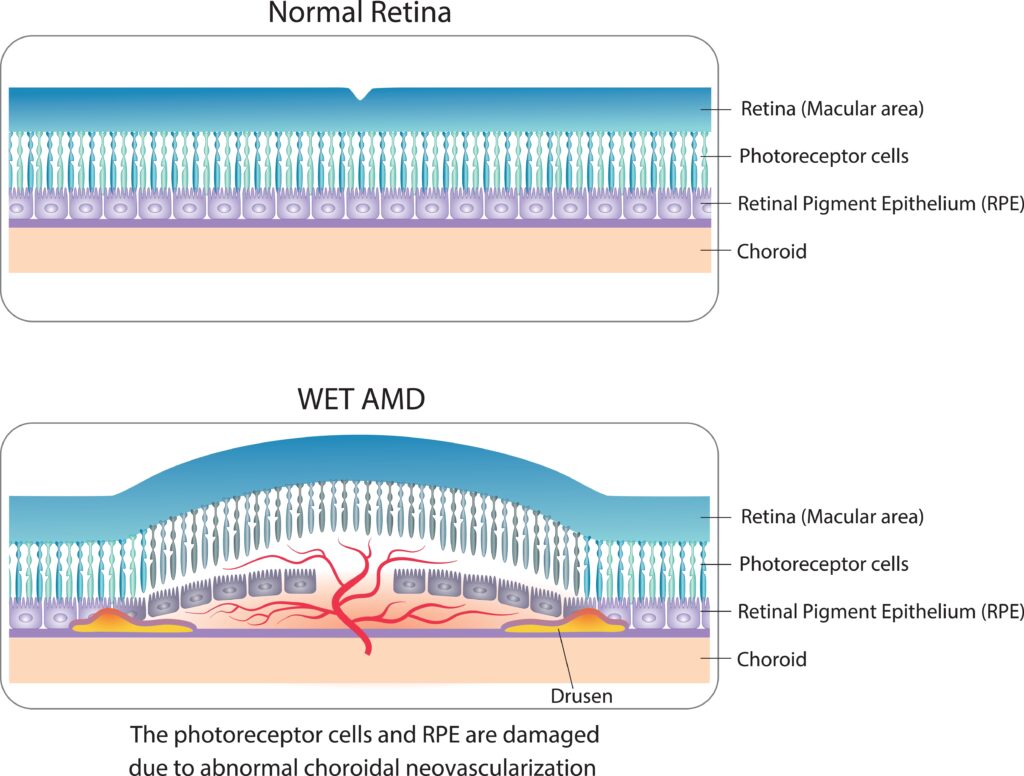
Getting older can mean the onset of certain eye conditions. One common age-related eye condition that can cause progressive vision loss is age-related macular degeneration (AMD).
About one in ten adults over 50 have some degree of age-related macular degeneration. Since it’s so common, it’s essential to be aware of age-related macular degeneration and how it can affect your vision.
Keep reading to discover what you should know about the condition’s causes, what puts you at risk, and how to prevent potential vision loss from age-related macular degeneration.
What is Macular Degeneration?

The macula is the retina’s center, the thin membrane that lines the back of your eye. Your retina is vital to your ability to see as it contains photoreceptor cells.
Photoreceptor cells take the light that passes through your eye and turn it into impulses sent to your brain. These impulses are then translated into images you can understand.
Macular degeneration occurs when the macula becomes damaged, killing these photoreceptor cells and limiting the amount of visual information your brain receives. This damage can occur in different ways, as there are two types of age-related macular degeneration.
Dry Age-Related Macular Degeneration
Dry age-related macular degeneration is the more common of the two forms of macular degeneration. Dry macular degeneration occurs when yellow deposits called drusen form under the macula, causing the macula to thin out and weaken.
Drusen usually builds up very slowly over time. Because of this, degeneration of the macula is also a slow process.
You won’t notice any issues with your vision at first. However, as years or decades pass, your macula becomes thinner and thinner.
As the macula becomes thinner, this can cause a total loss of your central vision.
Wet Age-Related Macular Degeneration
The second form of age-related macular degeneration is the wet kind and rarer of the two. It occurs when the blood vessels supplying oxygen to the retina, particularly the macula, grow abnormally.
These abnormal blood vessels then swell and leak. As the blood vessels swell and spread, it damages the retina as scar tissue forms.
Wet age-related macular degeneration tends to develop more quickly than dry age-related macular degeneration and often requires more immediate medical intervention.
Risk Factors for Developing Age-Related Macular Degeneration
Although anyone can develop age-related macular degeneration, some things can increase risk. These risk factors include:

- Being over 50
- Having high blood pressure
- Eating a high-fat diet
- Smoking
- Having a family history of age-related macular degeneration
If you know you’re considered at high risk for developing age-related macular degeneration, you must regularly schedule eye exams. Having eye exams is the only way to detect the eye condition.
An eye exam can diagnose the eye condition before developing any symptoms, making them especially necessary. Any vision loss due to age-related macular degeneration is irreversible because the macula cannot regenerate.
As many age-related eye conditions cause irreversible vision loss, it’s doubly important to have regular eye exams after turning 40, even if you’re not at an increased risk for age-related macular degeneration. Having eye exams after turning 40 ensures that your eye doctor can monitor your eyes.
Seeing them regularly will give them a baseline in case they notice something during an eye exam.
What are the Symptoms of Age-Related Macular Degeneration?
There are no noticeable symptoms during the early stages of age-related macular degeneration, especially dry macular degeneration. You may not develop any symptoms for years.
The earliest symptom most patients notice is that straight lines begin to appear wavy. As age-related macular degeneration develops and your vision becomes more affected, your central vision becomes more warped and blurry.
Eventually, your central vision can go completely blank, leaving you with only your peripheral vision. See your eye doctor before your next scheduled eye exam if you notice any of these symptoms.
If you have age-related macular degeneration, early diagnosis is best, making the eye condition easier to monitor and treat.
Preventing and Treating Age-Related Macular Degeneration

Although there’s no way to guarantee you’ll never develop age-related macular degeneration, lowering your risk is the best way to prevent it. You can reduce your risk by leading a healthy lifestyle with a balanced diet and no tobacco use.
But even by doing these things, you can’t prevent age-related macular degeneration, as many risk factors are out of your control. Seeing your eye doctor at St. Luke’s at The Villages regularly can help them diagnose age-related macular degeneration as soon as drusen or abnormal blood vessels begin to form.
From there, your eye doctor can keep better track of how the eye condition is progressing and suggest treatment as necessary. There’s no way to cure age-related macular degeneration or reverse damage to the macula once it’s occurred.
However, you can do some things to manage the eye condition and slow its progression.
Treating Dry Age-Related Macular Degeneration
Treatment options for dry age-related macular degeneration are limited. However, your eye doctor can prescribe certain vitamins and nutritional supplements to help slow its progression. You can also try to prevent further vision loss by leading a healthy lifestyle.
Treating Wet Age-Related Macular Degeneration
There are several treatments available to treat wet age-related macular degeneration. One can inject certain kinds of medication directly into the eye called anti-VEGF injections.
Anti-VEGF injections can inhibit further blood vessel growth. Laser therapies can also seal off and shrink swollen, leaking blood vessels.
These treatments often need to be repeated as their effects are temporary, but they can be quite effective in preventing further vision loss due to wet age-related macular degeneration.
If you’re at risk for age-related macular degeneration or think you may have the eye condition, take the next step by making an appointment at St. Luke’s at The Villages in Lake Sumter Landing, FL, now! It’s time to make your eyes the priority they need to be!









